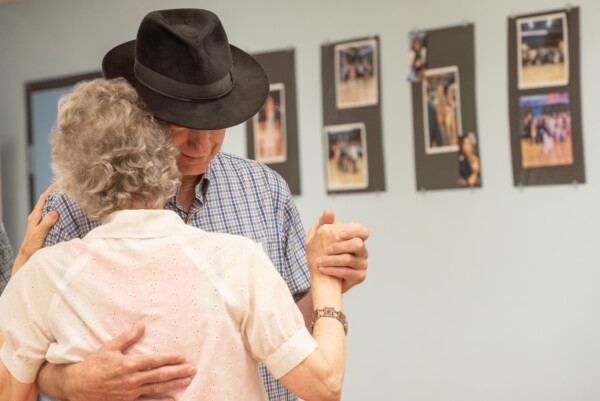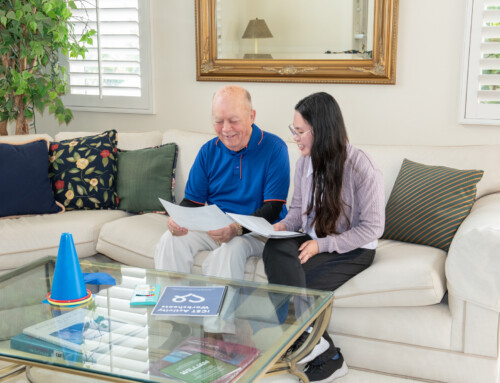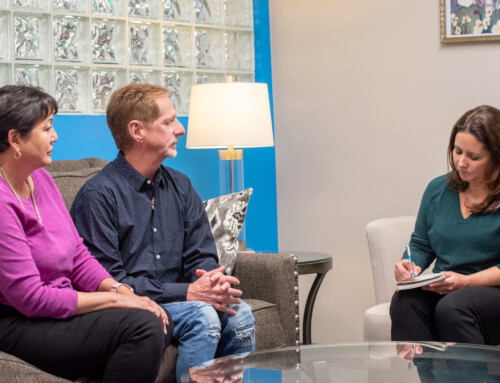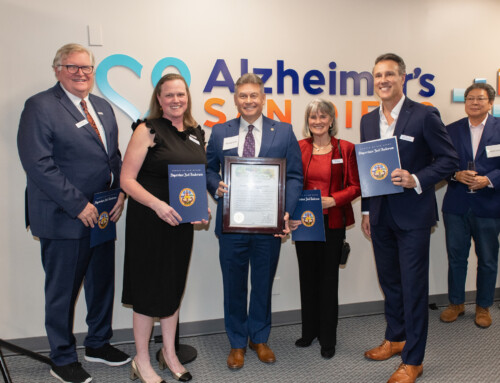
Dementia Support Corner
When life is going well, it is easy to feel grateful. But what about during the bad times? Living with dementia or being a caregiver to someone living with dementia can be very challenging, leading to many negative emotions like anxiety, anger, and sadness. In this blog, we will be talking with Alzheimer’s San Diego’s Support Group Specialist on how those impacted by memory loss can find and use gratitude to move through the good and bad of dementia – especially the emotions often felt throughout the journey.
What is Gratitude?
Alzheimer’s San Diego’s Support Group Specialist Ellen Boucher, BSW, describes gratitude as feeling thankful and appreciative for the simple pleasures and ordinary things in your life. Ellen explains that this could be as simple as being thankful for the chair you are sitting in or the ground under your feet. It can also mean feeling appreciative for a person in your life, your job, and other everyday moments. No matter what kind of situation you find yourself in, you can always find something to be grateful for.
Why is Gratitude Important?
Navigating dementia comes with tough situations and oftentimes takes a mental, emotional, and physical toll on those impacted by dementia. “Feeling sad, overwhelmed, angry, or any other negative emotion can really drain our battery,” says Ellen. Gratitude is a helpful tool in your self-care toolbox to ease these negative feelings and offer a new perspective. “Gratitude can recharge you,” says Ellen, “it empowers us, sustains us, keeps us healthy, and helps us walk through the dark times of grief and sadness.”
How Do You Find Gratitude During the Bad Times?
For many people, finding gratitude in bad situations does not come naturally. This was true for Ellen when she first started practicing gratitude. “Sadness, grief, anger – the negatives are so much easier for most people to just settle into and stay there,” says Ellen. Practicing gratitude can help pull you out of feeling those heavy negative emotions. Ellen has faith that there isn’t a bad situation people impacted by dementia face that someone can’t find something to be grateful for. “I am not going to say that it isn’t hard to find gratitude in tough moments, but it’s not impossible,” says Ellen.
To help people navigating dementia become familiar with practicing gratitude, Ellen encourages everyone try these tips:
- Learn to recognize when you are feeling negative emotions: Take a moment to become aware of your body. “You can’t have self-care unless you are self-aware,” says Ellen. Check out this blog that has more details on how to notice when you are feeling negative emotions. Once you are aware of feeling negative then you can start with your senses: as Ellen explains, “when I am in times of struggle, the smaller things fill my cup faster.”
- Start by being grateful for things you are experiencing at this moment using your senses: sight, smell, touch, taste, and hearing. For example, be thankful for the breath you just took, the warm sweater you’re wearing, or the roof above your head. “You can always find something to be grateful for in the moment, like sitting in a chair,” says Ellen. To become familiar with this, try finding three things using your senses to fill out this sentence: “I am thankful for ______.”
- Set aside time to practice: Finding gratitude, especially in the bad times, takes practice. Set alarms throughout the day, or identify times such as mealtimes, to remind yourself to check in with your body and become familiar with expressing gratitude. For Ellen, she likes to start her day with affirmations such as “thank you for this day filled with opportunities”. By creating a habit, finding some things to be thankful for will come more easily, especially when needed most.
How to Get Help Navigating Memory Loss
If you are living with dementia or are a caregiver for someone living with dementia in San Diego County and need help practicing gratitude or navigating the complexities of dementia, give our Dementia Care Coaches a call today at 858.492.4400. You will receive personalized dementia support for your unique situation. Also check out our free education classes, social activities, caregiver support groups, & more. Services are also available in Spanish.
Our “Dementia Support Corner” series is an opportunity for our Supportive Services to provide insight that can help people impacted by dementia.
By Heidi Emmenegger
RECOMMENDED: Medicaid and Medicare: Long-term Care Coverage for Dementia
Posted on November 17th, 2025






